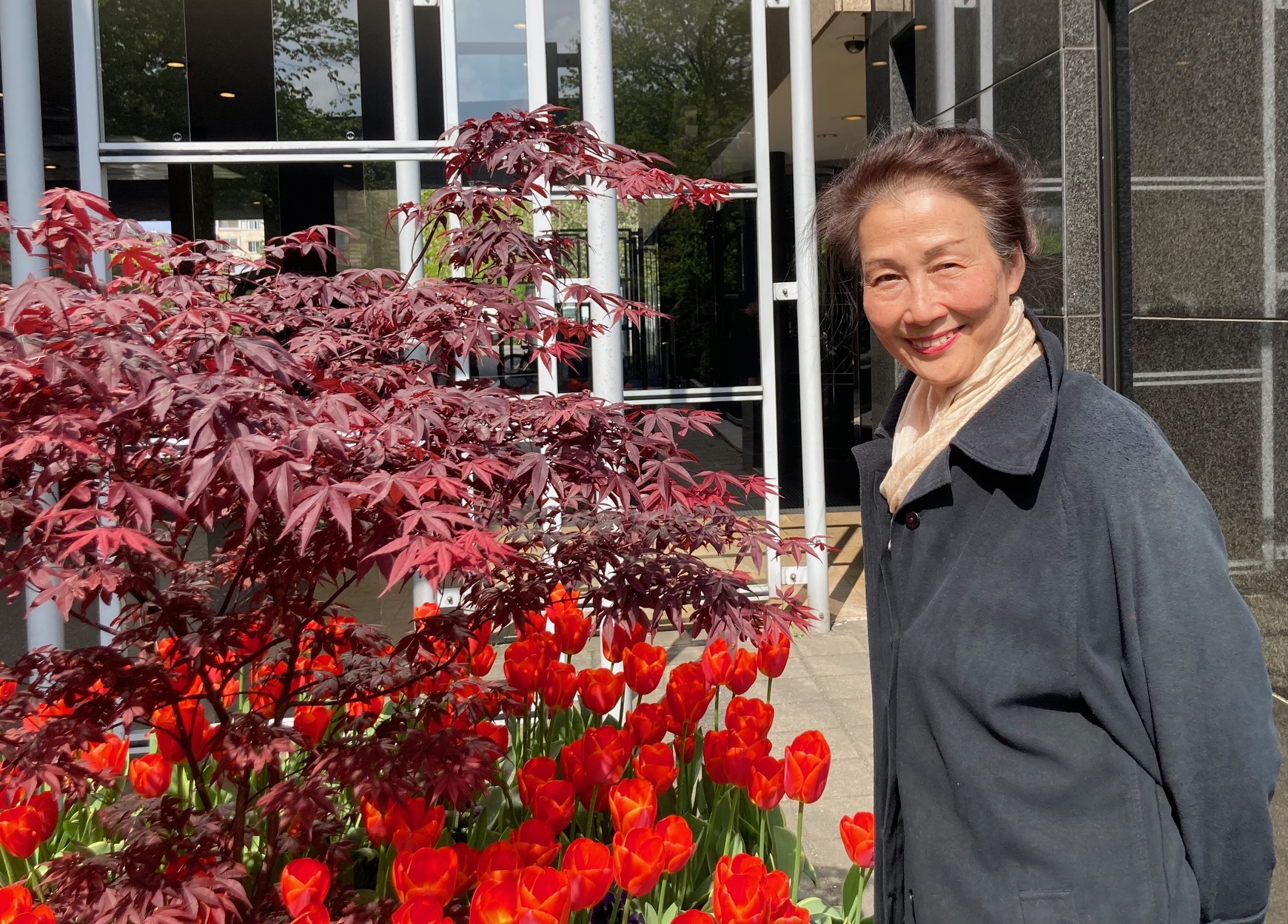“The Netherlands is innovative yet surprisingly traditional”

Almost 50 years ago, Kiyo Fujiki was working as a flight attendant for Japan Airlines when she met her future Dutch husband, who was on his way back to the Netherlands from a medical conference. She is the founder of the Japanese Helpdesk, a member of the Haiku Kring Nederland, loves visiting castles and praises the Dutch welfare, pension and education systems.
How did you end up in the Netherlands?
My late husband was onboard the airplane I was working on, together with his mother, and they were returning from a medical conference in Tokyo. A year later, I accepted his marriage proposal and decided to come and live in the Netherlands.
One condition of my mother agreeing to the marriage was that we would return to Japan twice a year — and we always did. My husband passed away in 2019, but I am staying. I have children and grandchildren, and I love living here.
How do you describe yourself — an expat, lovepat, immigrant…?
I am Japanese, a cosmopolitan, and above all, I am a Kyotonian. When I settled in Uithoorn, I realised there was a little friction between Dutch people who had no experience of Japanese culture and the Japanese working for companies entering the market here.
It seemed to stem from a lack of mutual understanding, so I started hosting small tea parties at home, which later developed into alternating Japanese and Dutch ladies’ tea gatherings. These eventually evolved into the Oranda-kai, or Dutch club, where international women would come together.
We used to meet at the public library in Uithoorn, and at one point around 75 women from 15 different countries were taking part in the cultural events and meetings.
The arrival of the internet changed all that, and we suspended the Oranda-kai in 2009 — although the different communities still meet.
How long do you intend to stay?
Until my life ends.
Do you speak Dutch, and how did you learn?
When I first moved here, I bought a very expensive Dutch book and teaching tapes at the Internationaal Boekhuis near the Concertgebouw in Amsterdam. During my first year in the Netherlands, while pregnant with my first child, I listened to the tapes every day and taught myself Dutch.
Later, I took courses at various schools, and after my two children started pre-school and nursery school, I took the national NT2 exams in the international student course at Amsterdam’s VU university. After passing, I enrolled in the psychology department. I did not complete the degree, as it was impossible to combine with my husband’s work and two small children.
Back then, when I was speaking Dutch every day at university, my Dutch was better than it is now.
What is your favourite Dutch thing?
So many things — sports such as hockey, swimming, skating, football and basketball. I’m tall, and I played basketball at high school in Japan. And skating — well, the Japanese national team had a Dutch coach, Johan de Wit, although he has retired now. The women are doing really well. Miho Takagi just won the 1,000 metre world title.
I also admire female politicians, writers, musicians, artists and comedians, and the Dutch royal family, with its links to the Japanese imperial family. I could go on.
Dutch beef, fries, herring, cheese and pancakes are delicious. The education, welfare, elderly care and pension systems are excellent.
How Dutch have you become?
I have become so Dutch that it’s difficult to return to Japan. But while I am here, I feel the spirit of Japan — and Kyoto — has become a deeper part of me than it was in my youth.
Which three Dutch people, dead or alive, would you like to have met?
Charlotte Sophie, countess of Bentinck. I read a book about her by Hella S. Haasse and last year I had a week’s holiday at the castle where she lived with my three grandchildren. She was originally from Germany but lived from 1715 to 1800 and was married to Willem Bentinck, lord of Doorwerth, Varel, Rhoon and Pendrecht. They divorced, but she had great fighting spirit.
The Six families. I’m currently reading a book by Geert Mak about the lives of the Six families, and they are also very interesting.
Sigrid Kaag, the former foreign minister who now works for the United Nations in Gaza. There is something intriguing about her.
What is your top tourist tip?
Apart from the flower fields in season, there is so much history here — the museums, medieval mansions, castles and fortresses. I’m fascinated by history, both Japanese and Dutch.
Tell us something surprising you have found out about the Netherlands.
It is a surprisingly innovative country, yet traditional at the same time. The Netherlands cherishes the beliefs and customs inherited from its ancestors but is also very forward-looking.
If you had just 24 hours left in the Netherlands, what would you do?
I’d take a castle tour with my family and grandchildren, dine in a top-notch restaurant, visit the gold bullion at the Dutch central bank [which has now been moved], and enjoy some authentic Dutch art. Then I’d end the day in a plane, taking a scenic flight around the Netherlands. That’s quite a lot to fit into a day!
Kiyo Fujiki was talking to Robin Pascoe. You can contact the Japanese Helpdesk here.
Thank you for donating to DutchNews.nl.
We could not provide the Dutch News service, and keep it free of charge, without the generous support of our readers. Your donations allow us to report on issues you tell us matter, and provide you with a summary of the most important Dutch news each day.
Make a donation